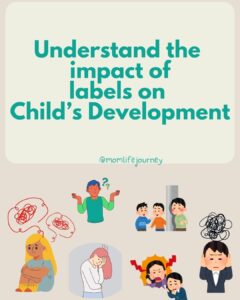
Labels can be powerful tools for understanding and categorizing the world around us. However, when it comes to children, the use of labels can have far-reaching and often negative consequences.
Labeling a child can have significant and lasting effects on their self-esteem, behavior, and overall development. Here are some key reasons why it’s important to avoid labeling children.
1. The Weight of Words
Children are like sponges, absorbing the words and attitudes of those around them. When a child is labeled, especially with negative terms, these labels can become a part of their identity. Imagine a child repeatedly called “lazy.” Over time, they might begin to see themselves through this lens, thinking, “I am lazy.” This internalized label can significantly impact their self-esteem, motivation, and behavior.
Here Harpreet Singh Grover, who did Independent Researcher on Parenting. Let’s see what he says about label’s on child.
Impact on Self-Esteem:
Labels can be internalized, becoming a part of how a child views themselves. If a child is labeled “stupid” or “clumsy,” they may start to believe they are inherently deficient in these areas, leading to a negative self-concept and reduced self-esteem.
Behavioral Influence:
Labels can act as a self-fulfilling prophecy. A child labeled as a “troublemaker” might think, “If everyone expects me to cause trouble, I might as well live up to that expectation.” This can reinforce negative behaviors instead of encouraging positive change.
2. The Social Consequence
Labels don’t just stay within the home; they follow children into their social environments. Peers, teachers, and other adults can also adopt these labels, influencing how they interact with the child. A child labeled “shy” may find that others stop inviting them to play or participate, further isolating them and reinforcing the label. This can lead to a cycle of exclusion and loneliness.
Peer Interaction:
Children labeled with negative terms can be marginalized by their peers. A child branded as “weird” or “difficult” might struggle to form friendships, impacting their social development and sense of belonging.
Teacher Expectations:
Educators can unconsciously lower their expectations for a child labeled as “struggling” or “slow.” This can limit the child’s opportunities to excel and receive the support they need, perpetuating a cycle of underachievement.
Performance Anxiety:
Children labeled as “gifted” may experience anxiety about maintaining this status. The fear of not living up to expectations can stifle their willingness to take risks and try new things, hindering their growth and learning.
3. The Pressure of Positive Labels
Even seemingly positive labels, like “gifted” or “smart,” can have unintended consequences. While these labels might boost a child’s confidence in the short term, they can also create immense pressure. Children may feel they must constantly live up to these high expectations, leading to stress and fear of failure.
Performance Anxiety:
Children labeled as “gifted” may experience anxiety about maintaining this status. The fear of not living up to expectations can stifle their willingness to take risks and try new things, hindering their growth and learning.
Fixed Mindset:
Positive labels can contribute to a fixed mindset, where children believe their abilities are static and unchangeable. This mindset can limit their resilience and willingness to embrace challenges, as they may fear that failure will expose their limitations.
Embracing a Growth Mindset
Instead of labeling, we can adopt a growth mindset approach, emphasizing effort, improvement, and resilience. Here’s how:
Focus on Behaviors, Not Traits:
When addressing a child’s actions, describe the behavior rather than labeling the child. For example, instead of saying, “You’re being bad,” try, “That behavior is not acceptable because it can hurt others.”
Praise Effort and Progress:
Celebrate the effort and progress your child makes rather than innate traits. Acknowledge the hard work they put into their tasks. For instance, “I’m really proud of how hard you worked on your homework tonight.”
Encourage a Love of Learning:
Foster curiosity and a love of learning by encouraging your child to explore their interests and try new things. Support their passions without attaching labels to their abilities.
Recognize Individual Strengths:
Every child has unique strengths and talents. Celebrate these without comparison. Whether it’s their kindness, creativity, or problem-solving skills, let your child know you appreciate their individual qualities.
At last I would say Celebrate Individuality
Avoiding labels and fostering a growth mindset helps children develop a strong, positive sense of self. It allows them to explore their potential without the constraints of predefined expectations. As parents and caregivers, our words and actions have the power to shape our children’s futures. By embracing each child’s individuality and nurturing their growth, we can help them become confident, resilient, and compassionate individuals.
In the end, every child is a unique individual with their own path to follow. Let’s celebrate their journey, support their growth, and avoid the limiting impact of labels. By doing so, we empower our children to discover and embrace their true selves, free from the constraints of labels and full of potential.